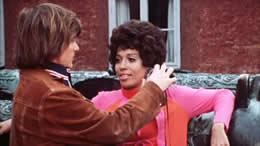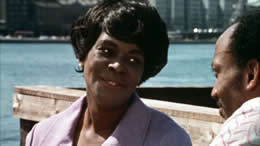

 When she arrives in Stockholm, popular singer Georgia Martin (Sands) brings along her usual companions, white-hating maid and surrogate mother figure Alberta (Gentry) and her gay business manager, Herbert (Furman), who starts a fling with a Swedish desk clerk (Barenett). Alberta sees an opportunity to fix
When she arrives in Stockholm, popular singer Georgia Martin (Sands) brings along her usual companions, white-hating maid and surrogate mother figure Alberta (Gentry) and her gay business manager, Herbert (Furman), who starts a fling with a Swedish desk clerk (Barenett). Alberta sees an opportunity to fix  up her boss with Vietnam deserter Bobo (Whitmore, drawing on some real life experience in the role), who wants her to use her fame to raise awareness for the plight of expatriates in Europe. However, the aloof diva instead becomes attracted to another vet, white photographer Michael (Benedict), who brings out the latent madness behind Alberta's insistence on racial purity.
up her boss with Vietnam deserter Bobo (Whitmore, drawing on some real life experience in the role), who wants her to use her fame to raise awareness for the plight of expatriates in Europe. However, the aloof diva instead becomes attracted to another vet, white photographer Michael (Benedict), who brings out the latent madness behind Alberta's insistence on racial purity.
While the 1970s were full of films grappling with the frequently shifting views on race and sex, none are quite like Georgia, Georgia, a surprising project written by the legendary author Maya Angelou. This was one of the earliest films really hitting the trickier areas of these relationships head on (given that interracial marriages were only recently legalized), a good three years before Susan George's career was virtually demolished due to her love scenes in Mandingo. The film was obviously shot on a very low budget in Sweden under the auspices of Kelly-Jordan Enterprises, who would go on to release Ganja and Hess and Honeybaby, Honeybaby, the latter also starring Sands after her early death from cancer. A striking presence and respected Broadway star most famous for A Raisin in the Sun (which she reprised on film), Sands also scored a stage hit in The Owl and the Pussycat and was seen in supporting roles in films like Hal Ashby's The Landlord. Though she doesn't quite convince as a pop star, she is a good actress and manages to sell the potentially off-putting role well.
The film itself is definitely hampered by its low production values and what look like some rushed creative choices (especially in the opening stretch), but the strength of its ideas still gives it a unique quality unlike anything else out there. A future star of TV's Battlestar Galactica and The A-Team, Benedict is fine enough as the main love interest but gets largely overshadowed by Gentry ("While you're sleeping, they're peeping"), who essentially steals the film with her increasingly chilling portrayal. The startling final scene almost swerves the film into gothic horror territory largely on the strength of her presence, closing the fil m on an indelible and deeply unsettling note.
m on an indelible and deeply unsettling note.
Distributed in America by Cinerama, Georgia, Georgia earned a brief VHS release from Prism back in the mid-'80s presumably on the basis of B enedict's presence. (His next film, the beloved Sssssss, took much longer to find a home video audience.) The film was shot in Super 16 and blown up to 35mm, so that version was obviously cropped and didn't look particularly impressive. The film essentially languished in obscurity for many years, though a handful of cultists managed to keep interest up (not to mention an excellent roundtable discussion in 2009 over at Temple of Schlock). The 2012 release on DVD from Scorpion is, not surprisingly, a substantial improvement as it restores both the film's original framing and its far more saturated color palette. It's still a pretty cheap-looking film, of course, but the results are infinitely more watchable. The original mono audio sounds fine given the basic nature of the original recording. On top of that you get a feature-length audio commentary with Benedict, director Stig Björkman (a controversial choice who stepped in when Angelou wasn't allowed to direct her own script), and moderator Steve Ryfle. It's a fun and candid track, pointing out some of the film's shortcomings (mainly its political content, who no one particularly seems to like) while revealing plenty of fun facts, such as the original intention to cast Eartha Kitt in the film and its original title of Georgia on My Mind, which had to be scuttled for obvious reasons. There's also plenty of context given for race relations at the time and the status of deserters in Sweden, among many other subjects; while the importance of the film may get inflated a bit from time to time, it's a very welcome study of a title that deserves another look. Also included is a six-minute selection of photos from the film (including some great production shots from Benedict's personal collection) and a Spanish theatrical trailer, which credits this as "Un filme de Maya Angelou - Prisionera de su destino!" Ryfle also contributes a two-page liner notes essay about the film; they're quite good and have some solid background info about the producers and the story behind the film itself, though his claim that the film is one of Angelou's "most powerful characterizations of the black American woman" will probably tick off more than a few literature teachers!
enedict's presence. (His next film, the beloved Sssssss, took much longer to find a home video audience.) The film was shot in Super 16 and blown up to 35mm, so that version was obviously cropped and didn't look particularly impressive. The film essentially languished in obscurity for many years, though a handful of cultists managed to keep interest up (not to mention an excellent roundtable discussion in 2009 over at Temple of Schlock). The 2012 release on DVD from Scorpion is, not surprisingly, a substantial improvement as it restores both the film's original framing and its far more saturated color palette. It's still a pretty cheap-looking film, of course, but the results are infinitely more watchable. The original mono audio sounds fine given the basic nature of the original recording. On top of that you get a feature-length audio commentary with Benedict, director Stig Björkman (a controversial choice who stepped in when Angelou wasn't allowed to direct her own script), and moderator Steve Ryfle. It's a fun and candid track, pointing out some of the film's shortcomings (mainly its political content, who no one particularly seems to like) while revealing plenty of fun facts, such as the original intention to cast Eartha Kitt in the film and its original title of Georgia on My Mind, which had to be scuttled for obvious reasons. There's also plenty of context given for race relations at the time and the status of deserters in Sweden, among many other subjects; while the importance of the film may get inflated a bit from time to time, it's a very welcome study of a title that deserves another look. Also included is a six-minute selection of photos from the film (including some great production shots from Benedict's personal collection) and a Spanish theatrical trailer, which credits this as "Un filme de Maya Angelou - Prisionera de su destino!" Ryfle also contributes a two-page liner notes essay about the film; they're quite good and have some solid background info about the producers and the story behind the film itself, though his claim that the film is one of Angelou's "most powerful characterizations of the black American woman" will probably tick off more than a few literature teachers!
![]()